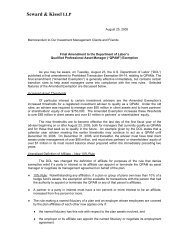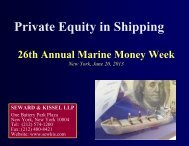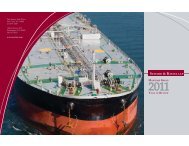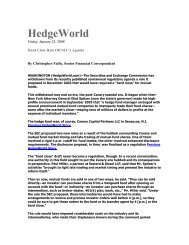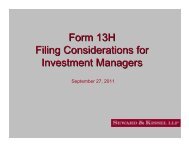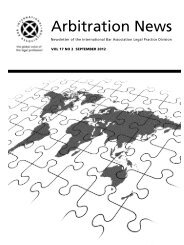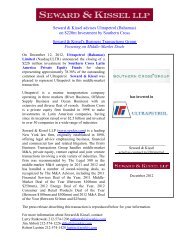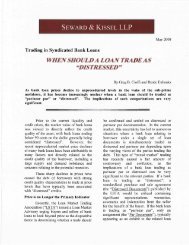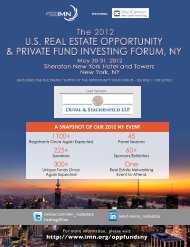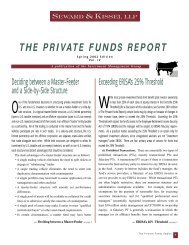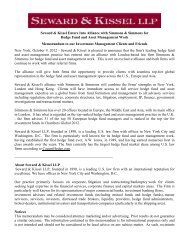Compliance Corner - Seward and Kissel
Compliance Corner - Seward and Kissel
Compliance Corner - Seward and Kissel
Create successful ePaper yourself
Turn your PDF publications into a flip-book with our unique Google optimized e-Paper software.
continued from page 16<br />
general advertising the requirement to<br />
establish <strong>and</strong> document a substantive,<br />
pre-existing relationship with potential<br />
investors. This change should permit<br />
private funds to advertise in periodicals,<br />
newsletters <strong>and</strong> other publications with<br />
public distribution, sponsor events or<br />
seminars accessible to the public, set<br />
up publicly accessible websites <strong>and</strong><br />
conduct other forms of general advertising.<br />
The change should also permit<br />
portfolio managers of private funds to<br />
have more flexibility in discussing the<br />
funds in interviews with the press, at<br />
conferences <strong>and</strong> in other public forums.<br />
Finally, the change should permit<br />
private funds to conduct general solicitations<br />
of potential investors, including<br />
solicitations through social media.<br />
Changes to Registered Adviser<br />
<strong>Compliance</strong> Programs<br />
Registered advisers to private funds<br />
often incorporate into their compliance<br />
programs the private placement offering<br />
requirements, <strong>and</strong> these requirements<br />
are often the focus of the SEC<br />
staff during an examination of a registered<br />
adviser. During an examination,<br />
the SEC staff seeks information about<br />
the exemptions under the Securities<br />
Act upon which each private fund relies<br />
<strong>and</strong> the names of current investors <strong>and</strong><br />
investors who previously purchased<br />
<strong>and</strong> redeemed securities of the private<br />
funds. The SEC staff also seeks copies<br />
of the offering memor<strong>and</strong>um <strong>and</strong> subscription<br />
agreement for each fund <strong>and</strong>,<br />
in the area of advertising, information<br />
about the registered adviser’s website,<br />
including sections of the site that are<br />
accessible only with a username <strong>and</strong><br />
password.<br />
As noted above, the amendments<br />
to the Private Offering Exemption will<br />
eliminate the requirement that private<br />
funds intending to engage in general<br />
advertising establish <strong>and</strong> document a<br />
substantive, pre-existing relationship<br />
with potential investors. Consequently,<br />
the compliance procedures <strong>and</strong> questionnaires<br />
used by these funds <strong>and</strong> their<br />
advisers to document the existence of<br />
the substantive, pre-existing relationship<br />
with potential investors may be<br />
modified substantially or, depending on<br />
the SEC’s rulemaking in connection with<br />
the amendments, eliminated. Registered<br />
advisers to these funds may, nonetheless,<br />
determine to maintain certain of<br />
the procedures or aspects of current<br />
questionnaires going forward for compliance<br />
control or other purposes.<br />
Anti-Fraud <strong>and</strong> Advertising Issues.<br />
While amended Rule 506 will likely permit<br />
private funds <strong>and</strong> their advisers to<br />
modify substantially or eliminate the procedures<br />
<strong>and</strong> questionnaires addressing<br />
when <strong>and</strong> to whom a private fund may<br />
advertise or make solicitations, the<br />
amended rule will not alter the content<br />
requirements applicable to private fund<br />
advertisements <strong>and</strong> solicitations. The<br />
anti-fraud provisions of the federal securities<br />
laws, including those under the<br />
Investment Advisers Act of 1940, will<br />
continue to govern the content of such<br />
advertisements <strong>and</strong> solicitations. These<br />
provisions generally provide that it is<br />
unlawful to make any untrue statement<br />
of material fact or to omit to state a material<br />
fact necessary to make the statements<br />
made, in light of the circumstances<br />
under which they were made, not<br />
misleading to an investor or prospective<br />
investor in a private fund.<br />
Like the anti-fraud requirements,<br />
the advertising requirements under the<br />
Advisers Act will continue to apply to<br />
advertising <strong>and</strong> marketing materials<br />
of private funds for which a registered<br />
adviser serves as adviser. These advertising<br />
requirements prohibit advertisements<br />
that, among other things, contain<br />
(i) testimonials about the adviser’s<br />
services, (ii) past specific profitable<br />
recommendations of the adviser, or (iii)<br />
any untrue statement of material fact,<br />
or which is otherwise false or misleading.<br />
These requirements also impose<br />
restrictions on presenting performance<br />
information.<br />
COMPLIANCE CORNER<br />
In light of the foregoing content requirements,<br />
the new, permitted audience<br />
for private fund information <strong>and</strong><br />
the SEC staff’s focus on this area during<br />
examinations, the marketing <strong>and</strong><br />
advertising materials of a private fund<br />
should include disclosures alerting potential<br />
investors that securities of the<br />
private fund may only be purchased<br />
by investors who are accredited investors.<br />
In addition, registered adviser<br />
compliance programs should continue<br />
to require the review of advertising <strong>and</strong><br />
marketing materials of private funds for<br />
purposes of compliance with the antifraud<br />
provisions <strong>and</strong> the advertising requirements<br />
under the Advisers Act. The<br />
compliance program should also incorporate<br />
guidance for portfolio managers<br />
<strong>and</strong> other fund personnel conducting<br />
public interviews.<br />
Documents <strong>and</strong> Procedures Supporting<br />
Reasonable Belief. Although<br />
private placements of securities conducted<br />
in reliance on the Private Offering<br />
Exemption currently are limited primarily<br />
to accredited investors, the SEC<br />
may provide additional guidance concerning<br />
the methods for establishing<br />
a reasonable belief that each investor<br />
in a fund relying on amended Rule 506<br />
is an accredited investor, particularly<br />
in light of the JOBS Act m<strong>and</strong>ate that<br />
all purchasers be accredited investors.<br />
The SEC may provide, for example, a list<br />
of non-exclusive methods for establishing<br />
a reasonable belief for this purpose.<br />
Such a list could include a requirement<br />
for a fund to obtain specific documentation<br />
of an investor’s net worth <strong>and</strong><br />
income. Private funds currently satisfy<br />
the accredited investor st<strong>and</strong>ard by requiring<br />
each investor, in the subscription<br />
agreement with the fund, to provide<br />
a representation to the fund that<br />
the investor meets one or more of the<br />
criteria of an accredited investor <strong>and</strong><br />
by concluding that it is reasonable for<br />
the fund to rely on that representation.<br />
Amended Rule 506 will in effect<br />
Continued on page 18<br />
I A A N E W S L E T T E R - 1 7 -<br />
M AY 2 0 1 2



